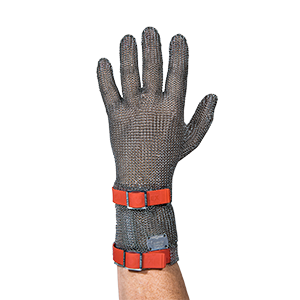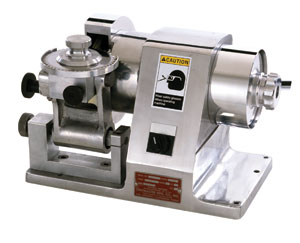Steel gloves, also known as chainmail gloves, are essential in various industries for providing protection against cuts, punctures, and other injuries. They are particularly valuable in environments where sharp tools and materials are frequently used, such as in kitchens, abattoirs, and manufacturing facilities.
Key Benefits of Steel Gloves
Cut and Puncture Resistance
- High Protection. Steel gloves are made from interlocking metal rings, offering superior protection against cuts and punctures from knives and other sharp objects.
- The robust construction ensures that the steel chain gloves can withstand heavy use and provide long-lasting protection.
Dexterity and Flexibility
- Enhanced Dexterity. Despite their protective nature, steel gloves are designed to allow for a high degree of dexterity, enabling precise and controlled movements.
- Flexible Design. The interlocking rings provide flexibility, allowing the gloves to conform to the shape of the hand and move naturally with it.
Hygiene and Safety
- Easy to Clean. Steel gloves are easy to clean and sanitise, making them ideal for use in food processing and other hygienic environments.
- Non-Absorbent. Unlike fabric gloves, steel gloves do not absorb liquids, reducing the risk of contamination and bacterial growth.
Applications of Steel Gloves
Food Industry
- Butchering and Meat Processing. Steel gloves are commonly used by butchers and meat processors to protect against cuts while handling knives and other sharp tools.
- Fish Filleting. They are also used in fish processing to prevent injuries during filleting and other tasks.
Manufacturing and Construction
- In metalworking industries, steel gloves protect workers from sharp edges and metal shavings.
- Construction. Construction workers use steel gloves to handle materials like glass and metal safely.
Hospitality and Culinary Arts
- Chefs and Kitchen Staff. Chefs and kitchen staff use steel gloves to prevent cuts while preparing food, especially when using mandolines, slicers, and other sharp kitchen tools.
Choosing the Right Steel Gloves
Size and Fit
- Proper Fit. Ensure that the gloves fit snugly without being too tight, as a proper fit enhances both protection and dexterity.
- Adjustable Straps. Many steel gloves come with adjustable straps to secure the gloves in place and provide a customised fit.
Material Quality
- Stainless Steel. Opt for gloves made from high-quality stainless steel, as they offer excellent resistance to corrosion and maintain integrity over time.
- Reinforced Areas. Look for gloves with reinforced areas, such as the fingertips and palms, for added durability and protection.
- Safety Standards. Choose gloves that meet relevant safety standards and certifications to ensure they provide adequate protection.
Where to Buy Steel Gloves Online
For those looking to purchase steel gloves online, several reputable suppliers offer a wide range of options.
- Specialised Safety Equipment Retailers. Websites dedicated to safety equipment often have a variety of steel gloves suitable for different industries.
- E-commerce Platforms. Major e-commerce platforms offer a broad selection of steel gloves, allowing you to compare prices, features, and customer reviews.
- KENTMASTER UK. Tried and tested in the UK for decades, a company that’s been servicing the industry from top to bottom since the 1950s. For selection and, most importantly, professional advice, these are the go-to companies in the UK.
Rules and Regulations for PPE in the UK Food Industry
Abattoirs and Slaughterhouses
General PPE Requirements
- Protective Clothing. Workers must wear protective clothing, including aprons, gloves, and boots, to prevent contamination and ensure personal safety.
- Steel Gloves. Essential for tasks involving sharp tools and equipment, steel gloves protect against cuts and punctures. They are particularly important during the butchering process to prevent injuries from knives and other sharp instruments.
- Hygiene Standards. To maintain hygiene standards, PPE must be regularly cleaned and sanitised. This includes washing and disinfecting steel gloves after each use.
Regulatory Compliance
- Food Hygiene Regulations. Abattoirs and slaughterhouses must comply with the Food Hygiene Regulations (EC) No 852/2004, which mandate the use of appropriate PPE to prevent contamination and ensure food safety.
- Animal Welfare Standards. Compliance with the Welfare of Animals at the Time of Killing (WATOK) regulations ensures humane treatment of animals and safe handling practices.
Commercial Kitchens and Restaurants
General PPE Requirements
- Protective Clothing. Staff must wear clean, suitable, and protective clothing, including aprons, gloves, and hairnets, to maintain hygiene and prevent contamination.
- Steel Gloves. While not legally required, steel gloves are recommended for tasks involving sharp tools, such as slicing and dicing, to protect against cuts and injuries.
Regulatory Compliance
- Food Safety Standards. Compliance with the Food Safety Act 1990 and the Food Hygiene Regulations (EC) No 852/2004 is mandatory. These regulations require the use of PPE to ensure food safety and hygiene.
- Personal Hygiene. Staff must maintain high personal hygiene standards, including regular handwashing and wearing clean protective clothing.
Butcheries
General PPE Requirements
- Protective Clothing. Butchers must wear protective clothing, including aprons, gloves, and boots, to prevent contamination and ensure safety.
- Steel Gloves. Essential for handling sharp knives and tools, steel gloves protect butchers from cuts and punctures. They are particularly important during the cutting and deboning processes.
Regulatory Compliance
- Food Hygiene Regulations. Butcheries must comply with the Food Hygiene Regulations (EC) No 852/2004, which mandate the use of appropriate PPE to prevent contamination and ensure food safety.
- Health and Safety Regulations. Compliance with the Health and Safety at Work Act 1974 ensures that butchers are provided with the necessary PPE to perform their tasks safely.
Specific Requirements for Steel Gloves
Usage and Maintenance
- Proper Fit. Steel gloves must fit properly to provide effective protection and allow for dexterity. Ill-fitting gloves can reduce protection and increase the risk of accidents.
- Regular Inspection. Steel gloves should be regularly inspected for damage and wear. Any damaged gloves must be replaced immediately to ensure continued protection.
- Cleaning and Sanitisation. Steel gloves must be cleaned and sanitised after each use to prevent contamination and maintain hygiene standards.
Training and Awareness
- Proper Use. Staff must be trained in the proper use of steel gloves, including how to wear, clean, and store them correctly.
- Safety Protocols. Regular training sessions should be conducted to reinforce safety protocols and ensure that staff are aware of the importance of using steel gloves and other PPE.
OVERVIEW
In the UK, stringent regulations govern the use of PPE in abattoirs, slaughterhouses, commercial kitchens, butcheries, and restaurants to ensure food safety and worker protection.
Steel gloves are a critical component of PPE, providing essential protection against cuts and punctures during food handling and preparation.
By adhering to these regulations and maintaining high standards of hygiene and safety, food industry establishments can ensure a safe and efficient working environment.
Reduce Risks, Prioritise Steel Gloves
Steel gloves are indispensable for ensuring protection and dexterity in various industries. By choosing the right gloves and using them properly, workers can significantly reduce the risk of injuries while maintaining efficiency and precision in their tasks. Whether in the food industry, manufacturing, or culinary arts, steel gloves provide the necessary safety and flexibility to perform demanding tasks with confidence.





